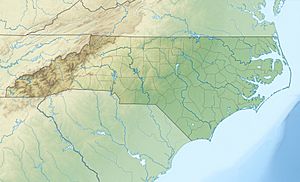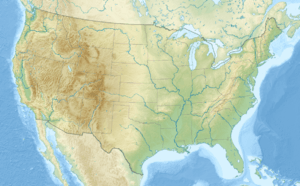Tysons Creek facts for kids
Quick facts for kids Tysons Creek |
|
|---|---|
|
Location of Tysons Creek mouth
|
|
| Other name(s) | Tributary to Deep River |
| Country | United States |
| State | North Carolina |
| County | Moore Chatham |
| Physical characteristics | |
| Main source | Bear Creek divide Pond about 0.25 miles northeast of Harpers Crossroads, North Carolina 530 ft (160 m) 35°34′29″N 079°27′17″W / 35.57472°N 79.45472°W |
| River mouth | Deep River about 1 mile northwest of Glendon, North Carolina 228 ft (69 m) 35°29′35″N 079°26′46″W / 35.49306°N 79.44611°W |
| Length | 8.51 mi (13.70 km) |
| Basin features | |
| Progression | south |
| River system | Deep River |
| Basin size | 12.81 square miles (33.2 km2) |
| Tributaries |
|
| Bridges | Siler City-Glendon Road, Mert McManus Road, NC 42, Jesse Phillips Road, River Road |
Tysons Creek is a small stream, about 4.18 miles (6.73 kilometers) long, located in North Carolina, United States. It flows into the Deep River. A stream like Tysons Creek that flows into a larger river is called a tributary. This particular stream is unique because it's the only one in the entire United States with the name Tysons Creek!
The Journey of Tysons Creek
Tysons Creek begins its journey in a pond. This pond is located about 0.25 miles (0.40 kilometers) northeast of a place called Harpers Crossroads in Chatham County. From there, the creek flows south. It then crosses into Moore County. Finally, Tysons Creek joins the Deep River. This meeting point is about 1 mile (1.6 kilometers) northwest of Glendon, North Carolina.
Tysons Creek's Home Area
Every river and stream has a special area of land that collects all the rain and snow that falls there. This collected water then flows into that river or stream. This area is called a watershed or drainage basin. Tysons Creek's watershed covers about 12.81 square miles (33.18 square kilometers).
This area gets a good amount of rain and snow, about 47.8 inches (121.4 centimeters) of precipitation each year. A large part of the land around Tysons Creek, about 51%, is covered by forests. This helps keep the water clean and provides homes for many animals and plants.
 | Janet Taylor Pickett |
 | Synthia Saint James |
 | Howardena Pindell |
 | Faith Ringgold |



